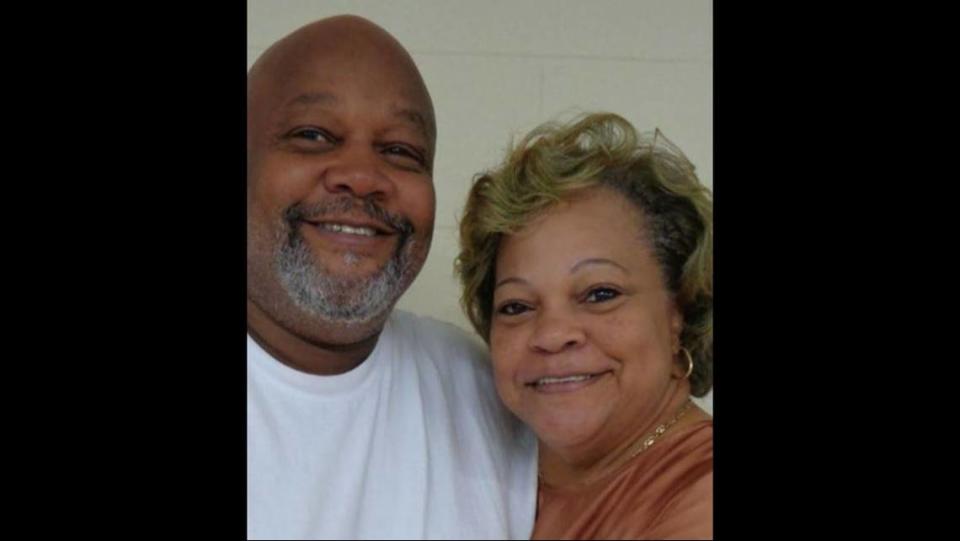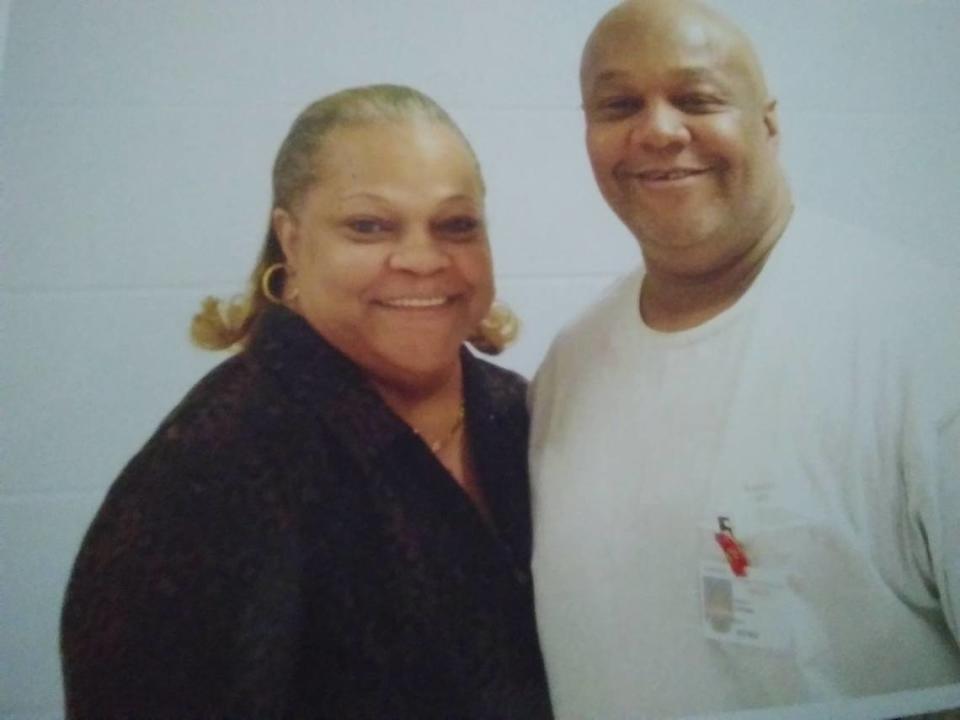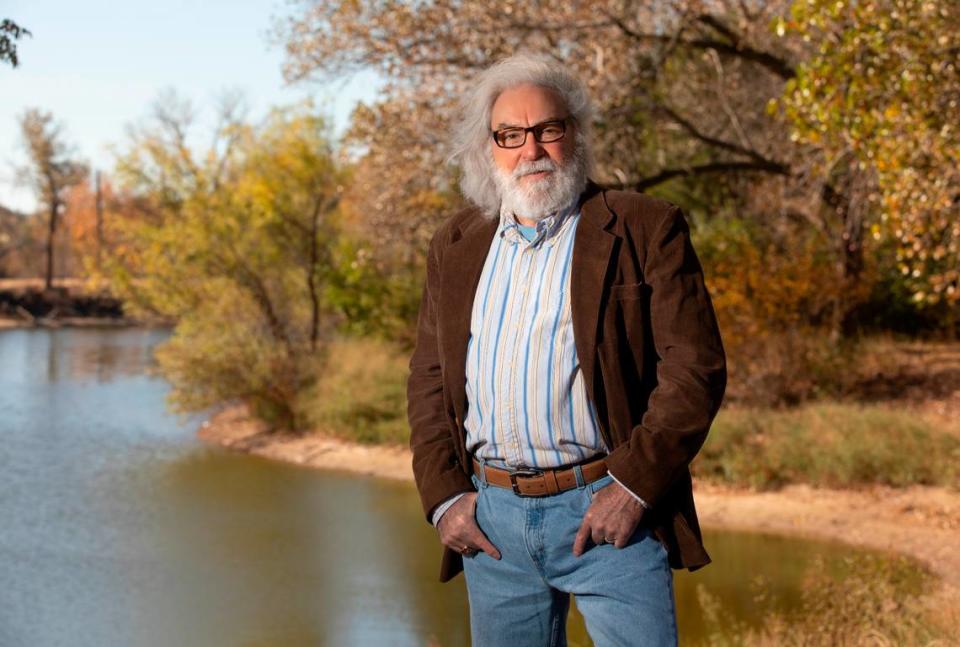Man got ‘excessive’ sentence for robbery. Will Kansas Gov. Kelly grant him clemency?
- Oops!Something went wrong.Please try again later.
Editor’s Note: “Reality Check” is a Kansas City Star series focused on holding those in power to their word and pulling back the curtain on decisions happening behind closed doors. This newsroom-wide project will bring fast facts as stories unfold — making sure our local officials and institutions are telling the truth, serving our communities well and following through on their promises. Have a suggestion for a future story? Email tips@kcstar.com.
During his more than three decades of incarceration, Sherman Wright has seen men who have killed come and go from Kansas prisons, his sister said. Yet, she noted, he remains there for lesser crimes.
Wright, 59, is serving time for a 1982 robbery he did when he was 18, as well as for six other Wyandotte County convictions for crimes such as aggravated robbery and burglary, which he committed in 1987 when he was 22 and 23.
Without dismissing her brother’s actions, Cynthia Crawford called the sentence he got — 66 years to life — “excessive” and “inhumane.” The state’s sentencing guidelines went into effect in 1993, but the changes did not work retroactively for hundreds of prisoners. Had Wright committed the same crimes today, he would have been sentenced to up to 15 years.
Wright is among hundreds of prisoners who in recent years have asked Democratic Gov. Laura Kelly for mercy and applied for executive clemency. Wright’s application was originally denied, but his supporters hope Kelly changes her mind.
In 2021, Kelly granted clemency — an umbrella term that includes pardons and commutations — to eight people. It marked a historic use of the governor’s power in a state where pardons have historically been rare. But since Kelly won reelection in 2022, advocates for criminal justice reform have waited to see if she will grant clemency to more people during her second term.
During his almost 36 years in prison, Wright’s parents died, as did a sister. Crawford, who is now battling leukemia, said she does not want her brother to “lose no more.”
“It hurts every day, really,” Crawford said of her brother’s imprisonment.
Sharon Brett, legal director of the ACLU of Kansas, which filed applications on behalf of 108 people, said Wright’s story is representative of hundreds, if not thousands, of incarcerated people who were sentenced under “highly punitive and draconian” laws that have since changed. They have families who are willing to embrace and care for them, she said.
“Many of them committed crimes of poverty,” Brett said. “Now we have incarcerated them for 30 years, and I think all of that at the end of the day begs the question: What is justice?”
Kelly, who has voiced support for resentencing people convicted of “nonviolent, first-time” drug offenses, has not granted commutations or pardons since the eight in 2021.

In Kansas, a three-member Prisoner Review Board reports to the governor on each clemency application. Since the beginning of fiscal year 2021, the board has reviewed nearly 360 applications, recommending just 14 favorably, according to prison officials.
Of the 395 applications Kelly’s office says it has received, 93 were denied while 294 remain under review. It’s “definitely possible” that Kelly could grant clemency in her second term, a spokesperson for her said.
The vast majority of the 108 people whose applications were submitted by the ACLU have not heard back, meaning they do not know if their applications remain pending.
Across the state line, Missouri Republican Gov. Mike Parson has more regularly granted pardons, though most apply to people already out of prison.
13,000 days in prison
Crawford described her and her brother’s upbringings in the north end of Kansas City, Kansas, as “real bad.” She recalled the city’s high crime rate, saying she saw a handful of people get killed when she was young.
Their father wasn’t around and their mother, who had six kids, couldn’t work, Crawford said. They had to steal to eat.
Some of Wright’s convictions stem from a break-in at a KCK music store, The Star reported at the time.
In another case, he robbed three people and beat two of them. One of the victims, a 63-year-old woman, was hit in the mouth, which broke her dentures, a prosecutor told the newspaper then.
One of the victims was a bailiff, Wright told The Wichita Eagle in 2012 for a story about how some 400 people convicted before 1993 were trapped in “old law” sentences. He believed officials wanted to “make an example” out of him because of it.
Since he was sentenced to the Kansas Department of Corrections in 1988, Wright has spent more than half of his life behind bars. His nearly 36 years in prison amount to more than 13,000 days, or about 430 months. He has been incarcerated at prisons across the eastern half of Kansas, including in Hutchinson, Winfield, El Dorado and Topeka.
Wright went to prison nearly a decade before KCK and Wyandotte County unified their governments. Ronald Reagan was president.

It’s unclear how much it has cost taxpayers to incarcerate Wright. The average cost per adult prisoner in 2020, though, was about $30,100 each year, according to state records.
Over the decades, Wright learned how to weld, served as a caretaker and trained service dogs to assist people who are disabled. He also helped raise money from prisoners to “support various charitable causes,” he wrote in his clemency application.
At the Lansing Correctional Facility, Wright has worked as the kitchen’s main cook. He hopes to open a food truck or restaurant when he gets out, his sister said.
“With Cynthia’s support, I plan to pursue a job cooking — which is my passion — and continuing to seek out mentoring opportunities to speak to youth about how to turn their lives around,” Wright wrote.
Esmie Tseng, the ACLU of Kansas’ communications director, said she was “shocked” that Wright was not among the people granted clemency in 2021. She also noted that young people age out of crime.
“Circumstances change and people change,” Tseng said.
‘Another chance’
Like Wright, Michael McCloud, one of the people granted clemency in 2021, had been convicted of robbery.
McCloud spent 27 years in prison for a string of armed robberies he committed in the early 1990s. Robbing a dozen businesses before he was caught, he was convicted of 12 aggravated robberies.

His situation was different from Wright’s in that McCloud was released from prison in 2018, but faced the possibility of being sent back after Johnson County prosecutors appealed a judge’s decision to modify his sentence.
Thanks to Kelly’s signature, McCloud now lives in the Wichita area.
Another of the eight people granted clemency, Joseph Jones, works at a nonprofit that aims to change probation and parole laws. He also received a criminal justice fellowship from Columbia University in New York.
But dozens of other people still behind bars hope Kelly will grant them clemency in the future and kickstart the next chapter of their lives.
One of them, Glenn Givens, 46, is set for possible release as early as 2027. He is imprisoned at the Hutchinson Correctional Facility for an aggravated robbery that occurred in 2009 in Wyandotte County. His custody level is “low medium.”
If released, Givens plans to live with his parents, help take care of his mother and work in heating and cooling.
As for Wright, his earliest possible release date is set for May 2025. When he applied for clemency two years ago, he had already served 85% of his minimum sentence.
Wright also noted that his medical conditions include high blood pressure, diabetes and mobility issues because of muscle cramps and knee pain. He is a chronic care patient, he wrote in his application.
“I also have an order from KDOC stating that I should only be placed in a bottom bunk bed because of my mobility issues,” Wright wrote. “These mobility issues also make it impossible for me to be a danger to other individuals.”
If Kelly were to grant him clemency, Wright would go live with his sister in Cass County, Missouri. Crawford, who described her brother as a “big teddy bear,” prays it happens.
“If she could just give him another chance at life,” Crawford said, “before his life is gone.”

